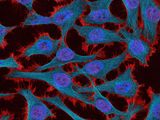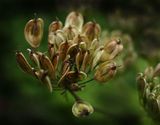Can we live longer?
Have you ever wanted to be immortal? Maybe everyone thought about it at least once, but only on the condition that we stay forever young, right? Otherwise, no one would want to prolong their old age - after all, it comes with a number of inconveniences such as cardiovascular problems, decreased mobility, joint pain, etc. And all for ever? I'd rather not, thank you.
But the prospect of being eternally young and healthy is quite another. And this question has been exciting science for a long time. The idea of tissue aging was given by evolutionary biologist Augustus Weissman as early as 1881. Radical for its time, the idea turns out to be particularly resourceful. 80 years later, Leonard Hayflick demonstrates that this is quite true - a principle known to us as the Hayflck limit.
Both scientists are right in their claim that cells gradually lose their ability to divide and participate in their own repair mechanisms, leading to their death. But with advances in biology, researchers have recently discovered another type of non-dividing cell in tissue called "aging cells." They are caused by cellular stress and, in addition to not being able to divide and contribute to tissue renewal, they are harmful for a completely different reason. It turns out that the so-called " aging cells" secrete various factors that lead to inflammation, change of extracellular space, fibrosis and tissue death [ref. 1] . These cells gradually accumulate in tissues with aging and are associated with various diseases.
Here comes the moment for another term - senolysis, or the directed elimination of the aging cells in question. Studies on laboratory animals have shown that this strategy reduces aging and increases the duration of the period in which these animals are healthy and do not suffer from chronic diseases associated with age changes. This is why this is currently seen as a potential "anti-aging" therapy and various compounds called senolytics are being developed to affect the elimination of aging cells or the substances they secrete. Such substances are also tested as a therapy against certain "old-age" diseases.
Before we proceed with discoveries about the potential of such a substance of natural origin, namely procyanidine C1, it is important to clarify that before science perceives this strategy as a reality, it must overcome a number of technical problems and enter into the depth and biological meaning of the process to appear such cells at all. For example, it is known that they also have their positive functions in the body, and eliminating them can sometimes lead to other complications and problems. In other words, we have a long scientific path ahead of us, before we dream of eternal life in a young body.
Grape seeds slow down aging
In their recent study , published in December of 2021, Chinese researchers screened a library of medical products for those with a potential effect as senolytics [ref. 2] .
Among them is the grape seed extract. After its detailed study, they isolated the substance procyanidine C1, belonging to the group of flavonoids, which indicates a strong effect against the excretion of inflammatory factors from aging cells. These results are obtained by treating cells in laboratory conditions when applying a low concentration of the substance.
When using higher concentrations of procyanidine C1 on aging cells, the researchers also demonstrated its potential to destroy them while the young cells remained intact.
Encouraged by these results, scientists continued the study on lab mice. They were able to show that when taking procyanidine after a certain age, mice had an extended lifes entire life by about 9%. In addition, after administration to young mice, they showed better physical condition.
Since chemotherapy is known to increase aging cells in tumors, the potential of this substance has also been tested as a combination with chemotherapy. Indeed, with their joint application, tumors reduced their volume by up to 75%, while in chemotherapy alone, this percentage was 44%.








